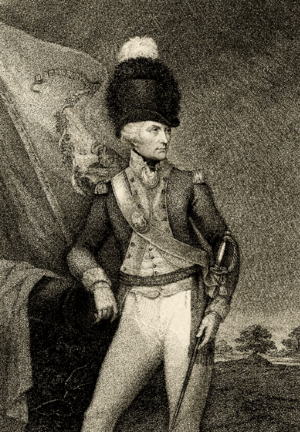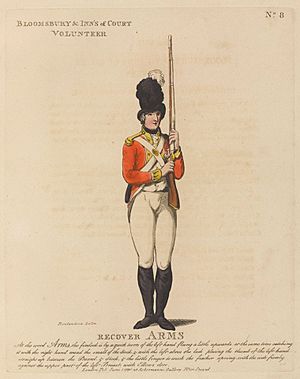Samuel Compton Cox facts for kids
Quick facts for kids
Samuel Compton Cox
M.A.
|
|
|---|---|

Portrait of Samuel Compton Cox from 1799, in militia officer uniform
|
|
| Born | 1757 |
| Died | 1839 |
| Occupation | barrister |
Samuel Compton Cox (born 1757, died 1839) was an important British lawyer, judge, and writer on legal topics. He became a Master in Chancery in 1804. A Master in Chancery was a senior legal official who helped judges with their work, especially in cases about fairness and property.
Contents
Samuel Cox's Early Life and Education
Samuel Cox was the son of another lawyer, also named Samuel Cox. He went to Westminster School, a famous school in London. In 1770, when he was about 13, he acted in a play called Andria. This was a Latin comedy by an ancient Roman writer named Terence. Samuel Cox played the character Mysis.
After Westminster, Samuel Cox went to Trinity College, Cambridge in 1774. He earned his first degree in 1778 and became a Fellow of the college in 1779. This meant he was a senior member of the college. He earned his Master's degree in 1781.
Becoming a Lawyer
While studying at Cambridge, Samuel Cox also started training to be a lawyer. He joined the Inner Temple in 1775, which is one of the four professional associations for barristers in London. In January 1781, he moved to Lincoln's Inn, another one of these associations. Later that same year, he officially became a barrister, which means he could argue cases in court.
Samuel Cox's Career and Public Service
Samuel Cox held several important jobs during his career. In 1787, he became a commissioner of bankrupts. This role involved helping to manage the legal process when people or businesses could not pay their debts. He held this position until 1798.
In 1798, he became the Second Justice of Carmarthen. This was a judicial role in Wales. However, in 1804, he took on a different, very important job: Master in Chancery. This was a high-ranking position in the legal system, where he helped manage complex legal cases, especially those related to fairness and property.
Military Service
During this time, Samuel Cox was also very active in the military. He was an officer in the militia, which was a group of citizens trained for military service, ready to defend the country if needed. He commanded six companies of the Bloomsbury and Inns of Court Volunteers. These were local volunteer groups formed to help protect London.
Work at the Foundling Hospital
From 1806 until his death in 1839, Samuel Cox served as the treasurer of the Foundling Hospital. This hospital was a famous charity that cared for abandoned children. He died at the hospital on March 25, 1839.
There is a memorial for him at the Foundling Hospital, created by the artist John Graham Lough. It looks like a sarcophagus (a stone coffin) and shows images of children from the hospital. The memorial is in the chapel, where Samuel Cox was also buried in the catacombs (underground burial places). A sermon (a religious speech) was given for him by the hospital's chaplain, Josiah Forshall, and was published in 1841.
Samuel Cox's Legal Writings
Samuel Cox was also known for his contributions to legal books. He added detailed notes to the fourth (1787) and fifth (1793) editions of important legal reports. These reports were collections of past court cases, specifically about "equity" law, which deals with fairness and justice. The original reports were written by William Peere Williams.
Cox also helped publish his own collection of legal cases:
- Reports of Cases Argued and Determined in the High Court of Chancery: And of Some Special Cases Adjudged in the Court of King's Bench (1790, Dublin, 4th edition vol. II)
- Reports of Cases Argued and Determined in the High Court of Chancery: And of Some Special Cases Adjudged in the Court of King's Bench (1826, vol. II)
These books are often referred to by the short name "Cox Eq Cas," which stands for "Cox's Equity Cases" or "Cox's Chancery Cases." They contain important legal decisions from the Courts of Equity between 1783 and 1796.
Samuel Cox's Family Life
Samuel Cox married Anne Pott in 1787. Anne was the daughter of a famous surgeon named Percival Pott. Samuel and Anne had several children:
- Anna, their oldest daughter, married Charles Pott, who also worked at the Foundling Hospital.
- Charlotte married Edward Leigh Pemberton. Their son, also named Edward Leigh Pemberton, later became a politician.
- Sarah married a doctor named Edward Thomas Monro in 1814.
- Eliza, their fourth daughter, married William Loftus Lowndes in 1818.
 | Aaron Henry |
 | T. R. M. Howard |
 | Jesse Jackson |


